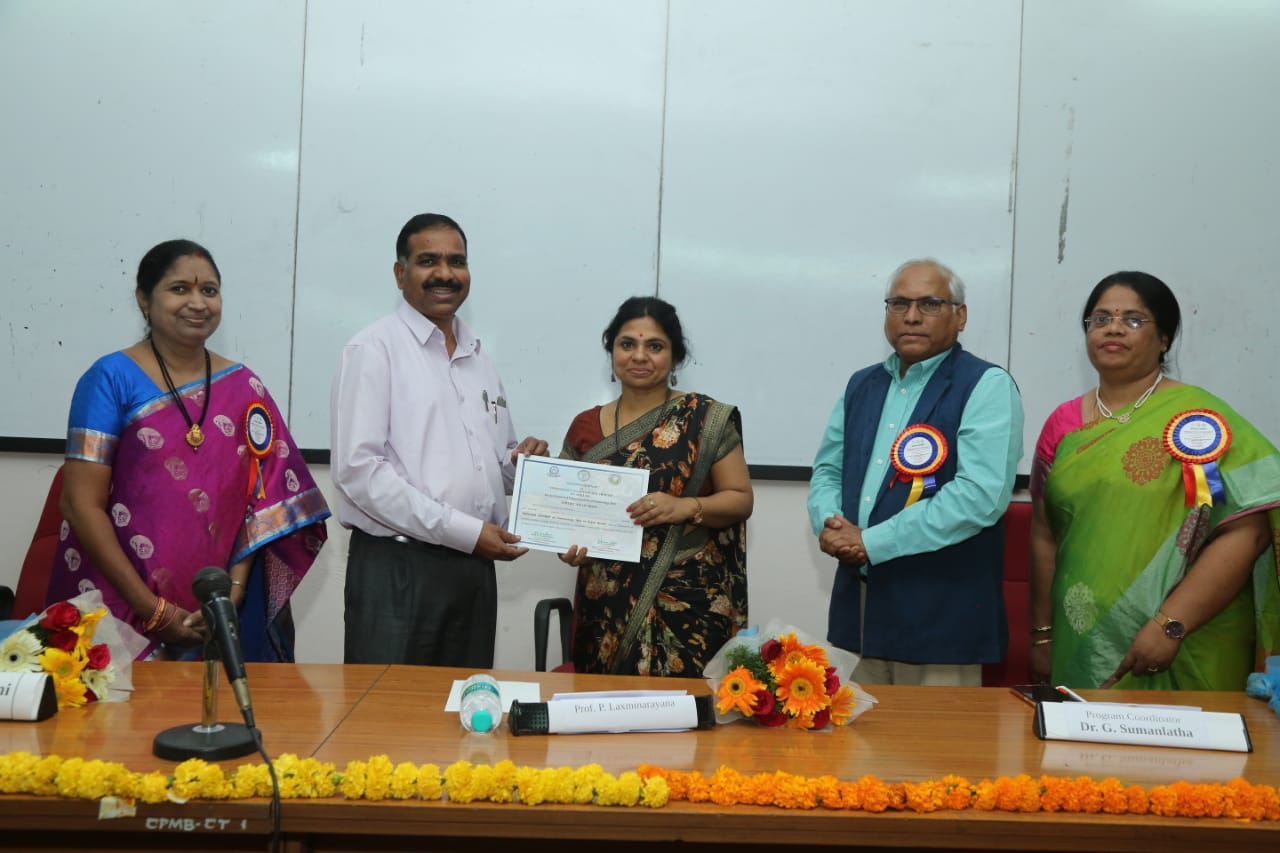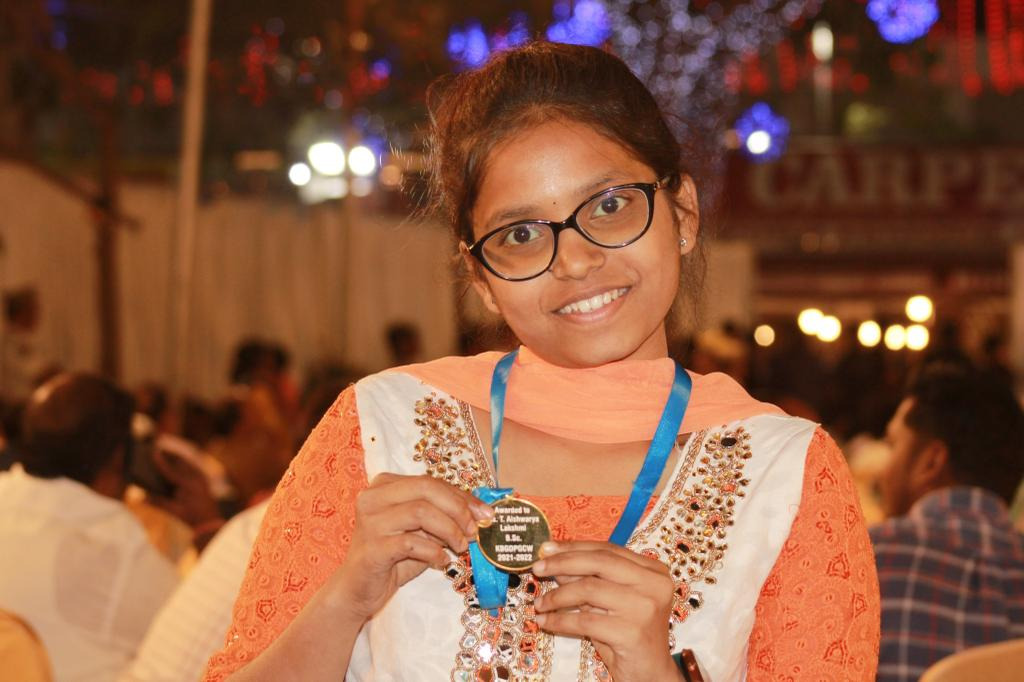The Department of Biotechnology was established in 2003. The department has all the basic infrastructural facilities needed for conducting teaching and research programme in different areas of Biotechnology.

The department has well equipped laboratories with tissue culture and double distillation facilities, class rooms with audio visual facilities. A separate instrumentation room consisting of sophisticated equipment, library with latest text books and e-books, Systems with Statistical Softwares, Bioinformatic Softwares and digital lessons are also available. The areas of research specialization in the department include Microbial Technology, Enzyme Technology, Plant Biotechnology, Bioprocess development, Bioinformatics and Biostatistics. The department has signed MoU with Nitza Biologicals, Hyderabad and Industrial Guar Products Ltd. Rajasthan. Collaborative and technology transfer projects are currently running with Industries and other Universities.
So far 17 batches of students have completed their B.Sc. degree course and several of them qualified in National level/state level M.Sc/M.B.A entrance tests and some of them are working in several prestigious institutions and industries. The department provides an ideal platform for interdisciplinary activities and interaction between students and faculty through Bioclub. The areas of research specialization in the department include microbial technology, enzyme technology, plant biotechnology, bioprocess development, bioinformatics and Biostatistics. Biotechnology department has successfully organized 8 training programmes in Biotechnology.
The major research areas include Plant Biotechnology, Computational Biology and Bioinformatics, Industrial Microbiology, Cancer, Molecular Biology, Biostatistics and Immunology. The research activities of faculty members are well-funded through research funding from agencies such as UGC and industries. Faculty members are involved in active industrial consultancy. The department has signed MoU with Nitza Biologicals, Hyderabad and Industrial Guar Products Ltd. Rajasthan. Collaborative and technology transfer projects are currently running with industries and other institutions.
To make an impact through research, technology based training and innovation.
Leverage global knowledge and help in developing human resources capable of leading creative developments by upholding intellectual qualities and human values.
| NAME | QUALIFICATION | DESIGNATION | EXPERIENCE |
|---|---|---|---|
| Dr. G. Srilatha Reddy | M.Sc., PGDBI, Ph. D | H.O.D, Associate Professor | 7 years |
| Ms. Shilpa | M.Sc. | Assistant Professor | 2 years |

Dr.G.Srilatha faculty from Department of Biotechnology has attended a National Seminar on “IMMUNOLOGY TALKS TO PUBLIC HEALTH” on 29 April 2023 on the occasion of International day of immunology-2023 and secured second Position in oral presentation.
Dr.G.Srilatha and K.Shilpa faculty from Department of Biotechnology Completed Departmental Research project “Therapeutic and Biological Aspects of Leaf Extracts from Indian Copperleaf Plant (Acalyphaindica)” and paper accepted for publication in International Journal of Plant and Environment with impact factor-1.


Published papers in International Journal of Research and Analytical Reviews (IJRAR) with impact factor 5.87
Faculty Attended a Workshop on Molecular Biology, Microbiology and nano technology at GM Reddy Research Foundation 06-11-2022 to 07-11-2022

1. K. Ramanjaneyulu , G. Srilatha Reddy , K. Keerthi , S. Nivas , P. Kaushik , N. Raju , Sree Bhushan Raju , H. Surekha Rani. Role of IL-6 (-174 G/C) Polymorphism and Renal Biopsy, Clinical and Immunoinflammatory Markers in Pthogenesis of Type 2 Diabetic Nephroathy.0134| VOLUME 116, METABOLISM CLINICAL AND EXPERIMENTAL, SUPPLEMENT , 154601, MARCH 01, 2021,DOI:https://doi.org/10.1016/j.metabol.2020.154601. IF-6.513.
Learning Resources of the Departments- library, computers, laboratories and other resources:
The Department has-

List of Articles Published by faculty and students During Lockdown Period -2020
| Students name | Title of the article | Position secured |
|---|---|---|
| Gunavardhini (BtMC 1st year) | Life during lockdown | 1st position |
| Gunavardhini (BtMC 1st year) | I love my family- importance of family | 3rd position |
| Niharika (BtMC 3rd year) | Not a mini idiot Box - Importance of mobile during lockdown | 1st position |
| Chandana Patel (BtMC 3rd | The positive side of Covid 19 on environment | 2nd position |
| Gunavardhini (BtMC 1st year) | Importance of mobile during lockdown | 5th position |
| Sudeshna Patra (Faculty BtMC) | Lesson learnt during Corona virus Pandemic | 3rd position |
T. Aishwarya laxmi (1111-19-487-027) Student from BTMC (2022 batch) secured gold medal
Gunavardhini BTMC IIIrd (2022 batch) ranked 15th in CPGET and HUCET
D. Wilcina Genevieve from BTMC 3rd year - secured 5th place and selected for National level championship, IIT Kharagpur.
Secured 1st place in group discussion and enacting chemistry around you Poster presentation competition.
Micro aura - Intercollegiate competition in St. Francis college - Video making - 1st place
Navrang 2k21- 1st place in mono acting
2nd place in micro Ad making
2nd place in singing competition
1st place in Chem idol intercollegiate competition - St. Francis Col
| Year | Name | Seminar/workshops | Organizers | Any Prize |
|---|---|---|---|---|
| 2021-22 | D. Poojitha | International day for biodiversity celebrations 2022 | TS Government | |
| 2017-18 | P. Divya Yadav | Little Flower Degree College, Uppal, Hyderabad. | Presented paper on Biodegradation of xenobiotics”, |
| Won First prize | ||||
|---|---|---|---|---|
| 2017-18 | B.Sc III Yr and II Yr (20 students) | One day workshop on Food technology | Loyola Degree College, Alwal, Secunderabad. | Participated |
| 2018-19 | Arfa , Aakanksha and Humera | National technical symposium –NEOZION-18 | CBIT, Gandipet, Hyderabad. |
Presented poster on nanotechnology in medicine- Won First prize |
| 2018-19 | Vasavi, maheswari & Pranitha | National technical symposium –NEOZION-18 | CBIT, Gandipet, Hyderabad | Presented poster on Artificial meat. |
| 2018-19 | Shilpa & Harshika | National technical symposium –NEOZION-18 | CBIT, Gandipet, Hyderabad | Presented poster on stress tolerance in sorghum (UGC project) |
| Courses | Intake(Entry level) |
Success Rate
|
|||||
|---|---|---|---|---|---|---|---|
| 2021-2022 | |||||||
| B.Sc (Bt.M.C) Final Year | 29 | 29 | 29 | 100 | |||
| B.Sc (Bt.M.C) Second Year | 52 | 50 | 50 | 100 | |||
| 2020-2021 | |||||||
| B.Sc (Bt.M.C) Final Year | 26 | 26 | 26 | 100 | |||
| B.Sc (Bt.M.C) Second Year | 29 | 29 | 29 | 100 | |||
| 2019-2020 | |||||||
| B.Sc (Bt.M.C) Final Year] | 27 | 27 | 27 | 100 | |||
| B.Sc (Bt.M.C) | 26 | 26 | 26 | 100 | |||
| Second Year | |||||||
| 2018-19 | |||||||
| B.Sc (Bt.M.C) Final Year | 25 | 25 | 25 | 100 | |||
| B.Sc (Bt.M.C) SECOND YEAR | 27 | 27 | 27 | 100 | |||
Internships: The Department of Biotechnology conducted a four day workshop in enzyme technology in collaboration with nITZA Bioventure, Hyderabad. The company selected 12 (6 from III Yr & 6 from II Yr) students, as interns for two months internship in their company, based on their workshop performance. These students will be trained in Molecular Biology, Microbiology and Enzymology.
| S.No | Name of the student | Class |
|---|---|---|
| 1 | Yasmeen | B.Sc III Yr |
| 2 | K. Swarnamanjari | B.Sc III Yr |
| 3 | Shivani | B.Sc III Yr |
| 4 | Sitara | B.Sc III Yr |
| 5 | Sharanya | B.Sc III Yr |
| 6 | Divya | B.Sc III Yr |
| 7 | Akanksha | B.Sc II Yr |
| 8 | Maheswari | B.Sc II Yr |
| 9 | Bhargavi | B.Sc II Yr |
| 10 | Prasanna | B.Sc II Yr |
| 11 | Mounika | B.Sc II Yr |
| 12 | Praneeta | B.Sc II Yr |
One week of student internship has been organized by the department of Biotechnology in collaboration with MAA research foundation from 22-08-2022 to27-08-2022.



A Three day workshop on “Hands on training in Isolation, Production & Purification of industrially important enzymes”:
Venue: Biotechnology lab
Date: 22nd-25th Sep 2018
The Department of Biotechnology organized a four-day workshop on “Hands on training in Isolation, Production & Purification of industrially important enzymes”, in collaboration with Nitza Bioventure, Hyderabad (22nd-25th Sep 2018). A Total of 40 students attended the workshop and got trained in industrial production of rennin(from mucor) and bromelin (pine apple) enzyme, quality check and down-stream processing techniques. Students had an opportunity to perform dialysis and column chromatography and SDS page techniques. Enzymes were immobilized using sodium alginate method and then tested for application on meat tenderization (bromelin) and cheese production (Renin). At the end of each day students reported their results and on the final day students reported their yields and the best group was awarded with prize.






| Year | Name | Seminar/workshops | Organizers | Any Prize |
|---|---|---|---|---|
| 2017-18 | P. Divya Yadav (B.Sc III Yr) | Symposium on “ Biodegradation of non-degradable pollutants” | Dept oLittle Flower Degree College, Uppal, Hyderabad. (17th Sep 2017) |
Presented paper on Biodegradation of xenobiotics”, won First prize |
| 2017-18 | B.Sc III Yr and II Yr (20 students) | One day workshop on “Food Tec2k17 Expo” | Dept of Food technology, Loyola Degree College, Alwal, Secunderabad. (19th-Sep 2017). | Participated |
| Nature of the project | Duration Year From To | Title of the project | Name of the funding agency |
Total Grant (Rs)
|
|||
|---|---|---|---|---|---|---|---|
| Minor Project | 2018-19 | PI:Dr.Annapurna Bhavani: “Study of physiological and Biochemical variability associated with salicylic acid induced abiotic stress tolerance in | UGC | 4,10,000 | 3,05,000 | ||
| sorghum”. | |||||||
| Inter-Disciplinary Projects | 2016-18 | PI:Dr.Annapurna Bhavani: Production and purification of Angiotensin converting enzyme inhibitor for the use of anti-cancer therapy | College Management-Department fund in the form of chemicals | - | - | ||
| Industry Sponsored | 2016-18 (Dept of Biotechnology) | PI:Dr.Annapurna Bhavani: A novel cost effective approach for the fermentative production of dextran by indigeneous Leuconostoc species using food waste. | Industrial Guar products, Ltd, Neemrana, Rajasthan | 30000 | 10000 | ||
| Student Research projects | 2017-18 | Comparative study of parameters effecting the wine production | -- | -- | -- | ||
| 2017-18 | Assessment of growth conditions required for hydroponics | -- | -- | -- | |||
| Department/Organization/Institution | Outcome |
|---|---|
| State/Internal | |
| Dept. of Statistics, Kasturba Gandhi college | Conducted certificate course in Biostatistics and clinical trials |
| Life science & Chemistry departments, Kasturba Gandhi college | Bioclub activities |
| Nitza Biologicals, Hyderabad | Conducted workshop for students, completed one project |
| Venex institute, Hyderabad | Conducted Mock M.Sc entrance, Students were given fee concession |
| SITAM, Hyderabad | conducted career counseling session, Students were given admission into M.B.A with fee concession |
| Kalpana Chemicals Ltd, Hyderabad | Completed one project |
| National: | |
| National Biotechnology helpline Foundation, Jaipur | Conducted national Biotech talent search examination, 12 students have qualified with 89 as the best rank. |
| International: | |
| Hill’s pet nutrition and research lab, Topeka, KS, USA | Completed one project |
The Bio-club is a student organization for students in the Biology departments of Kasturba Gandhi Degree and PG College for women. The BioClub hosts Plays, songs and Fun events. The aim of the organization is the care and the expansion of student networks thereby contributing to the quality development of the college through this "life science - cluster".
The Department has conducted an International Webinar on “Molecular Biology- Tools and Applications”, June 12th 2020.
The Department organized a four-day workshop on “Hands on training in Isolation, Production & Purification of industrially important enzymes”, in collaboration with Nitza Bioventure, Hyderabad (22nd-25th Sep 2018). A Total of 40 students attended the workshop and got trained in industrial production of rennin(from mucor) and bromelin (pine apple) enzyme, quality check and down-stream processing techniques.